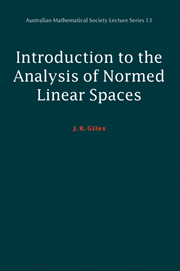Book contents
- Frontmatter
- Contents
- Preface
- Chapter I NORMED LINEAR SPACE STRUCTURE AND EXAMPLES
- Chapter II SPACES OF CONTINUOUS LINEAR MAPPINGS
- Chapter III THE EXISTENCE OF CONTINUOUS LINEAR FUNCTIONALS
- Chapter IV THE FUNDAMENTAL MAPPING THEOREMS FOR BANACH SPACES
- Chapter V TYPES OF CONTINUOUS LINEAR MAPPINGS
- Chapter VI SPECTRAL THEORY
- Appendix
- Historical notes
- List of symbols
- List of spaces
- Index
Chapter IV - THE FUNDAMENTAL MAPPING THEOREMS FOR BANACH SPACES
Published online by Cambridge University Press: 05 June 2012
- Frontmatter
- Contents
- Preface
- Chapter I NORMED LINEAR SPACE STRUCTURE AND EXAMPLES
- Chapter II SPACES OF CONTINUOUS LINEAR MAPPINGS
- Chapter III THE EXISTENCE OF CONTINUOUS LINEAR FUNCTIONALS
- Chapter IV THE FUNDAMENTAL MAPPING THEOREMS FOR BANACH SPACES
- Chapter V TYPES OF CONTINUOUS LINEAR MAPPINGS
- Chapter VI SPECTRAL THEORY
- Appendix
- Historical notes
- List of symbols
- List of spaces
- Index
Summary
In addition to the Hahn–Banach Theorem the three mapping theorems, the Open Mapping Theorem, the Closed Graph Theorem and the Uniform Boundedness Theorem are vital for the development of any general theory of Banach spaces.
In these theorems we begin to appreciate the importance of the completeness condition. The proofs are based on Baire category arguments which reveal the implications of completeness for the metric topology. So we begin by developing this theory and demonstrate something of its force before applying it to establish the fundamental mapping theorems.
BAIRE CATEGORY THEORY FOR METRIC SPACES
In complete metric spaces the metric topology has important characteristics and a knowledge of these is indispensable in establishing many significant results in the analysis of normed linear spaces and elsewhere.
We recall the following definition from the analysis of metric spaces.
Definition. Given a metric space (X, d), a subset A is said to be dense in (X, d) if its closure Ā = X.
This means that A is dense in (X, d) if and only if every point of X is either a point of A or a cluster point of A. Equivalently, A is dense in (X, d) if and only if for every x ∈ X and ε > 0, we have B(x; ε) ∩ A ≠ ∅.
The following concept related to density is used to partition metric spaces into disjoint classes.
- Type
- Chapter
- Information
- Introduction to the Analysis of Normed Linear Spaces , pp. 139 - 170Publisher: Cambridge University PressPrint publication year: 2000



